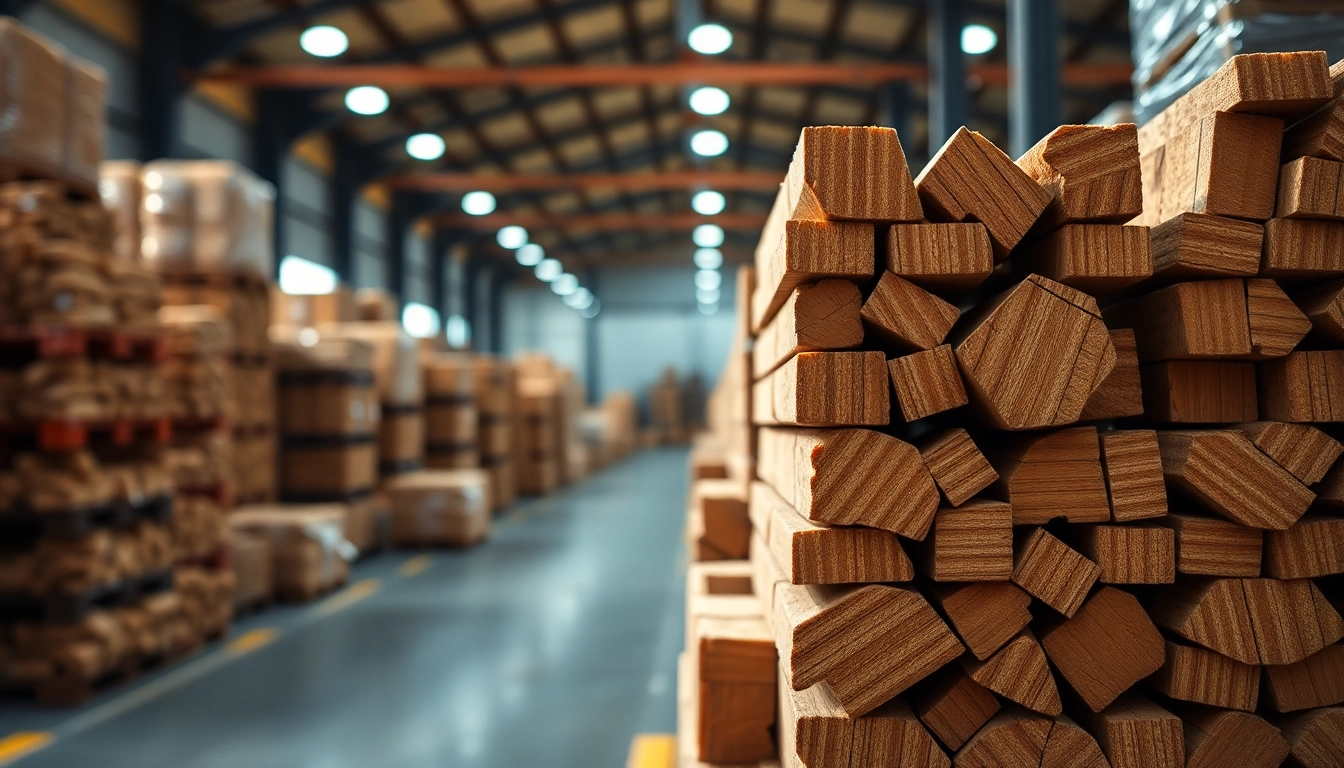Understanding Pini-Kay Briquettes
What Are Pini-Kay Briquettes?
Pini-Kay briquettes are a specialized form of biofuel crafted from compressed wood materials, primarily sawdust and wood chips. Their distinctive hexagonal shape, often featuring a central hole, not only facilitates efficient burning but also enhances their structural integrity, preventing deformation during combustion. These briquettes are widely recognized for their high energy output and low ash production, making them a preferred choice for both residential and industrial heating solutions. Manufactured using advanced techniques, Pini-Kay briquettes are designed to provide a clean-burning alternative to traditional firewood, contributing to a more sustainable approach to energy consumption.
Benefits of Using Pini-Kay Briquettes
The advantages of using Pini-Kay briquettes extend beyond their Eco-friendly production process. Some significant benefits include:
- High Calorific Value: Pini-Kay briquettes typically boast a calorific value ranging from 18 to 20 MJ/kg, ensuring a high-energy yield per unit burned.
- Consistent Quality: They are produced under controlled conditions, leading to uniformity in size, shape, and density, which enhances performance during combustion.
- Low Ash Content: With less than 3% ash residue, they promote cleaner heating and reduce the frequency of chimney or flue maintenance.
- Environmentally Friendly: Being manufactured from renewable resources, they contribute significantly to reducing carbon footprints compared to fossil fuel alternatives.
- Convenience: The easy-to-store format and long burning time make them a practical choice for heating solutions in various settings.
How Pini-Kay Briquettes Are Produced
The production process of Pini-Kay briquettes involves several stages, ensuring that the final product meets high standards of quality and consistency:
- Raw Material Collection: The briquettes are made from completely natural wood sources, including MDF and sawdust, ensuring that no harmful additives are integrated into the final product.
- Drying: The raw materials are dried to reduce moisture content, which is critical for achieving optimal combustion characteristics.
- Compression: The dried wood materials are compressed using hydraulic or mechanical presses to form solid briquettes. This step is crucial as it contributes to their density and burn efficiency.
- Curing: The briquettes are then cured to enhance their durability, allowing them to maintain their shape during transportation and storage.
- Packaging: Finally, the finished briquettes are packaged in bulk or smaller units, ready for distribution to consumers and businesses.
Choosing the Right Pini-Kay Briquettes Supplier
Key Considerations When Selecting a Supplier
Selecting a reliable supplier for Pini-Kay briquettes is pivotal for ensuring consistent quality and supply. Key factors to consider include:
- Reputation: Research the supplier’s market reputation by reading customer reviews and testimonials.
- Certifications: Verify that the supplier holds relevant certifications that demonstrate their commitment to sustainability and product quality.
- Production Capacity: Ensure that the supplier has adequate production capabilities to meet your demand consistently.
- Quality Assurance: Ask about the quality control processes they have in place to maintain product standards.
- Customer Support: Look for suppliers who offer reliable customer service, as this will be beneficial for addressing any issues that may arise.
Evaluating Supplier Credentials and Certifications
Before finalizing a supplier, it’s important to evaluate their credentials and certifications. Some reputable certifications to look for include:
- FSC Certification: Indicates that the wood sources used are sustainably managed.
- ENplus Certification: Assures that the briquettes adhere to European quality standards for solid biofuels.
- ISO Standards: Certification under ISO 9001 indicates a high level of quality management practices.
By ensuring that your supplier holds these certifications, you can guarantee a product that meets international standards for quality and sustainability.
How to Request Samples from Pini-Kay Briquettes Suppliers
Requesting samples is a crucial step in evaluating potential suppliers. Here’s how to approach this process:
- Identify Your Needs: Before reaching out, clarify your specific needs, including quantity and quality expectations.
- Contact Potential Suppliers: Reach out through professional channels, explaining your interest in their briquettes and your intent to purchase.
- Specify Sample Type: Request samples of the specific briquette types you are considering, noting any preferences for size and packaging.
- Evaluate Samples: Once received, assess the samples based on burn quality, ash production, and overall handling.
- Follow Up: After evaluation, follow up with your feedback, and ask about full-scale pricing and availability.
Cost and Pricing Factors for Pini-Kay Briquettes
Understanding Market Pricing for Briquettes
Market pricing for Pini-Kay briquettes can fluctuate based on a variety of factors such as geographical location, demand, and production costs. Typically, prices per ton can range significantly based on the supplier and quality metrics. Understanding these elements helps consumers make informed purchasing decisions.
Comparing Costs Between Suppliers
To ensure you are getting competitive pricing on Pini-Kay briquettes, it’s prudent to compare costs among different suppliers. Consider employing the following methods:
- Bulk vs. Retail Pricing: Often, purchasing in bulk leads to significant discounts compared to retail prices.
- Transportation Costs: Factor in delivery charges when comparing offers, as these can affect overall expenditure.
- Quality Differences: A higher price may be justified by superior quality or supplier reliability.
Potential Discounts and Bulk Pricing Options
When planning to purchase Pini-Kay briquettes, inquire about discounts and bulk pricing options. Many suppliers offer tiered pricing models or discounts for first-time customers, large orders, or repeat purchases. Establishing a relationship with a supplier can also lead to beneficial pricing negotiations, ensuring you receive optimal value without sacrificing quality.
Applications of Pini-Kay Briquettes in Various Industries
Residential Heating and Cooking Solutions
Pini-Kay briquettes are a popular choice for residential heating and cooking. Their high calorific value and low ash content make them efficient and practical for home use:
- Wood Stoves: Ideal for use in wood-burning stoves, offering long-lasting heat while maintaining cleanliness.
- Outdoor Grills: They can also be utilized in outdoor grills and barbecue setups, providing a reliable heat source without excessive smoke.
Commercial and Industrial Uses of Pini-Kay Briquettes
Beyond residential applications, Pini-Kay briquettes find substantial usage in commercial and industrial sectors:
- Manufacturing Facilities: Many manufacturers utilize briquettes for heating their facilities, ensuring an efficient and cost-effective energy solution.
- Food Processing: Briquettes are also utilized in food processing plants, particularly in cooking and heating processes where monitored temperatures are essential.
Eco-Friendly Alternatives in the Energy Sector
Pini-Kay briquettes serve as an eco-friendly alternative within the larger energy sector. Their renewable nature contributes to carbon-neutral practices, aligning with environmental sustainability goals. The transition from fossil fuel reliance to biomass products like these briquettes helps mitigate the adverse effects of climate change, promoting cleaner air and healthier ecosystems.
Optimizing Your Supply Chain with Pini-Kay Briquettes
Streamlining Orders and Deliveries
Efficiency in managing the supply chain for Pini-Kay briquettes is crucial for ensuring steady operations. This involves:
- Clear Communication: Maintain open lines of communication with your supplier to address any issues promptly.
- Just-in-Time Deliveries: Optimize ordering practices to reduce storage costs and ensure freshness of the product.
Ensuring Quality Control Throughout the Supply Chain
Establish rigorous quality control checks throughout the supply chain process to avoid inconsistencies in product quality:
- Inspection Procedures: Implement routine inspections at various stages of the supply chain, from raw material sourcing to final product delivery.
- Feedback Loop: Create a robust feedback system with the supplier for reporting quality concerns and encouraging continuous improvement.
Building Long-Term Relationships with Suppliers
Building a long-term partnership with a reliable supplier of Pini-Kay briquettes can lead to numerous advantages:
- Trust and Transparency: Developing trust enhances collaboration, leading to smoother operations.
- Better Pricing Negotiation: Long-term buyers may gain access to better pricing structures and exclusive offers.
- Shared Innovation: A strong relationship means both parties can work together to innovate and improve product offerings.


